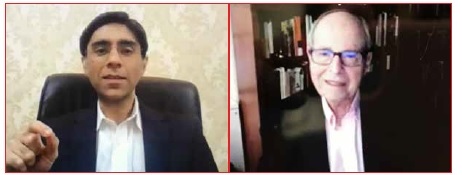Moeed Yusuf Urges the World Not to Abandon Afghanistan
By Elaine Pasquini

Washington, DC: As the Taliban government in Afghanistan continues to spark concern for countries in South Asia and around the globe, Marvin Weinbaum of the Middle East Institute hosted a virtual discussion on November 4 with Dr Moeed Yusuf, Pakistan’s National Security Advisor and Special Assistant to Prime Minister Imran Khan on national security and strategic policy planning.
 |
Moeed Yusuf |
Marvin Weinbaum |
“What seems to me sitting here in Pakistan and looking at the equation is that most countries are playing a wait-and-see game,” Yusuf said. “Unfortunately, whether with Ashraf Ghani or the Taliban, if wait-and-see takes place that means no money coming in for assistance…so basically we have set it up to fail.”
In response to an oft-repeated assertion that Pakistan got what it wanted with a Taliban-led government in Afghanistan, Yusuf pointed out that no country would want a neighbor “that has no money to run the country, no real experience to govern and with a border of 1,600 miles that for four decades has caused millions of refugees, a terrorism problem, internally displaced people and just since 9/11 over 80,000 casualties. The idea that this is what Pakistan would have hoped for is irrational and does not make any sense.”
What Pakistan wants is an “inclusive government…and that there should be no terrorism from Afghan soil,” he said. “This is identical to what the US and others in the world are saying, but there is one basic difference. We are again talking of a different approach to what the US and some others in the West are thinking. We are saying engage with the new political reality immediately and constructively.”
If the Doha process had not failed, Afghanistan would have had an inclusive government, Yusuf argued. “The Taliban would have been part of it, all Afghan factions would have been part of it and from our perspective, having seen Afghanistan for centuries, unless you have some kind of inclusivity which in the Afghan context means ethnic groups…chances are you won’t have a stable government.”
Yusuf urged the world community to engage with the Taliban, as the posture of wait-and-see, from Pakistan’s perspective, is tantamount to abandonment. “Ultimately, in trying to hurt the Taliban are we going to end up hurting the 39 million Afghans is the basic question we need to answer,” he explained. The abandonment of Afghanistan in the 1990s led to civil war, economic collapse, government collapse and ultimately 9/11.
“We shouldn’t mask ourselves from the reality that today it may be someone else’s problem,” he continued. “But it was someone else’s problem in 1989 and 1990 as well and ten years later it was the entire world’s problem. So, let’s not make that mistake and figure out how to balance our goals with keeping Afghan women and men safe.”
Accused of talking for the Taliban, Yusuf explained that, while the US may feel there is now no threat to the US coming from Afghanistan, “for Pakistan it is impossible to disengage.” With a 1,600-mile border…there will be a refugee crisis; ISIS-K is there, TTP (Tehrik-e-Taliban Pakistan) that has killed thousands of Pakistanis is there…and we will have a real problem with a collapsed Afghanistan on our hands.”
If the US or the international community adopts a policy of abandonment towards Afghanistan “the outcome is going to be identical to what it was thirty years ago,” he warned. “That is why I am saying make sure humanitarian assistance gets there for the sake of the average Afghan and then let’s figure out how to get to inclusive governance by using the ability to provide assistance and promise legitimacy down the road. If anyone thinks that ISIS-K is going to stay confined to Afghanistan or a mass migration problem is going to remain confined to Afghanistan or Pakistan, that’s not what history tells us.”
As Pakistan’s national security advisor it is his responsibility to look after Pakistan’s security, which entails negotiating with the Taliban government in Kabul, he stated. “I think there are general interests in legitimacy and assistance and, if that is true, there could be a middle ground on what concessions one side makes versus what the other side makes. But not doing it is essentially setting Afghanistan up for a collapse and I just don’t understand how that helps anyone.”
Moderator Weinbaum raised the possibility of large refugee flows to Pakistan, especially as winter approaches and Afghans face starvation without sufficient humanitarian assistance.
“I think what we really should focus on is how to prevent that situation,” Yusuf responded. “Let them have the mechanisms, let them run their economy…let the banking channels function, let the expats give them money, let trade happen.” The alternative, he warned, is an eminent collapse. “We need to find a way to ensure that those people do not end up in the misery that seems to be coming if the world just sits back and watches this unfold.”
On the subject of containing ISIS-K, he said the group would find safe havens anywhere there is lawlessness, so preventing Afghanistan’s collapse is of utmost importance.
“You do need counterterrorism mechanisms,” he continued, “but we are a bit confused. Does the US at this point think that the Islamic State…is not a threat to US interests and the US homeland and, thus, if it is a local problem, then fine? If that is the thinking, we do not agree with that analysis. It is a global threat and a global problem.”
In conclusion, Yusuf urged the US and the international community to give Afghans the support they need and “see if they can get to a point where Afghanistan is peaceful with a semblance of stability,” which will benefit all countries in the region and the world.
(Elaine Pasquini is a freelance journalist. Her reports appear in the Washington Report on Middle East Affairs and Nuze.Ink.)
-----------------------------------------------------------------------------
Back to Pakistanlink Homepage

